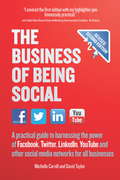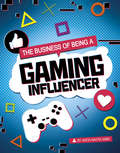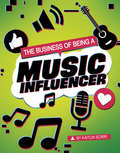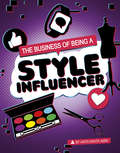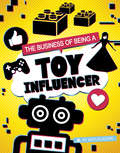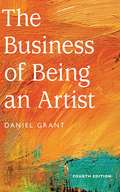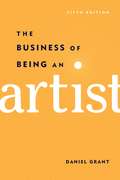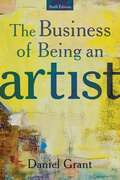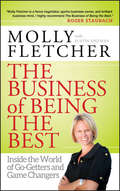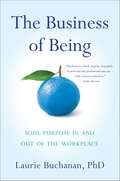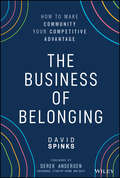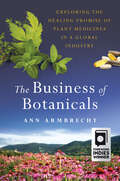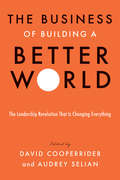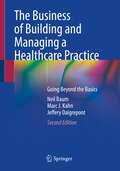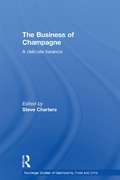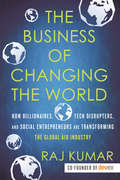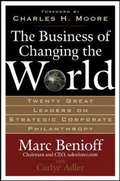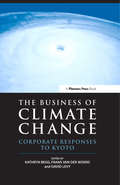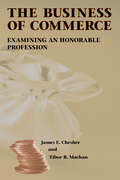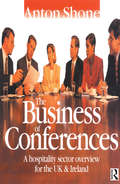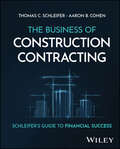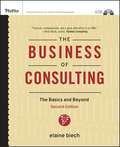- Table View
- List View
The Business of Being Social 2nd Edition: A practical guide to harnessing the power of Facebook, Twitter, LinkedIn, YouTube and other social media networks for all businesses
by David Taylor Michelle CarvillWhat is social media? Have you got a facebook page but are unsure how it can benefit your company? Or do you want to monitor your social media activity to see its effectiveness?Learn how to understand and utilize social media for business.From the basics to the most complex issues The Business of Being Social breaks down every aspect of social media and explains step-by-step how you can create a strategy for success. Social media exploded onto our screens but most businesses use traditional marketing methods and are confused how to harness the benefits. Make sure you're using social media to its full potential.Whether you're a business owner or need social media for marketing to set up new social media channels such as Pinterest or YouTube, build your community or find out how to use keywords and SEO, The Business of Being Social covers all these aspects and more. From helping you to build your brand and promote communication between yourself and your customers, to driving customers to your website and learning from companies who have made their social media campaigns a success, The Business of Being Social is your one-stop guide to the ins and outs of social media. Learn how to: Create a viable social media strategy Build and use channels such as Twitter, Facebook and LinkedIn Create customised apps, communities and use keywords Monitor any activity such as paid-for advertising Understand your audience and what content they want Integrate your social media activity into your marketing strategiesDiscover the secrets to social media for your business."As a business owner, how can you ensure that your company's voice and message is heard loud and clear. Thankfully, online visibility experts, Michelle Carvill and David Taylor, have put their heads together and published The Business of Being Social." The Good Web Guide"Up-to-date, thorough, very interesting and informative, well-written, engaging, and highly practical. Michelle and David clearly know their stuff and they've done a great job of combining and presenting their expert knowledge in this book." Birds on the Blog
The Business of Being Social 2nd Edition: A practical guide to harnessing the power of Facebook, Twitter, LinkedIn, YouTube and other social media networks for all businesses
by David Taylor Michelle CarvillWhat is social media? Have you got a facebook page but are unsure how it can benefit your company? Or do you want to monitor your social media activity to see its effectiveness?Learn how to understand and utilize social media for business.From the basics to the most complex issues The Business of Being Social breaks down every aspect of social media and explains step-by-step how you can create a strategy for success. Social media exploded onto our screens but most businesses use traditional marketing methods and are confused how to harness the benefits. Make sure you're using social media to its full potential.Whether you're a business owner or need social media for marketing to set up new social media channels such as Pinterest or YouTube, build your community or find out how to use keywords and SEO, The Business of Being Social covers all these aspects and more. From helping you to build your brand and promote communication between yourself and your customers, to driving customers to your website and learning from companies who have made their social media campaigns a success, The Business of Being Social is your one-stop guide to the ins and outs of social media. Learn how to: Create a viable social media strategy Build and use channels such as Twitter, Facebook and LinkedIn Create customised apps, communities and use keywords Monitor any activity such as paid-for advertising Understand your audience and what content they want Integrate your social media activity into your marketing strategiesDiscover the secrets to social media for your business."As a business owner, how can you ensure that your company's voice and message is heard loud and clear. Thankfully, online visibility experts, Michelle Carvill and David Taylor, have put their heads together and published The Business of Being Social." The Good Web Guide"Up-to-date, thorough, very interesting and informative, well-written, engaging, and highly practical. Michelle and David clearly know their stuff and they've done a great job of combining and presenting their expert knowledge in this book." Birds on the Blog
The Business of Being a Gaming Influencer (Influencers and Economics)
by Anita Nahta AminHave you dreamed of making money by playing video games? Getting paid to show off your gaming skills online sounds like an awesome career, but it takes more than just game skills. Learn about the basic business skills and economics behind this career in influencer marketing, all while staying safe online.
The Business of Being a Music Influencer (Influencers and Economics)
by Kaitlin ScirriAre you always looking for the newest bands and singers? Do you love to talk about music and share your musical opinions with others? Then you might have what it takes to be a music influencer. Learn about social media marketing and basic economics, and discover what it takes to become a music influencer, all while staying safe and having fun.
The Business of Being a Style Influencer (Influencers and Economics)
by Anita Nahta AminDo you like trying new hair and make-up products? Are you always the first of your friend group to wear new trends? Then you might be on track to become a social media style influencer. Learn how your original takes on fashion could translate into a career by exploring the economics and business skills behind influencer marketing, while staying safe online.
The Business of Being a Toy Influencer (Influencers and Economics)
by Kaitlin ScirriImagine getting paid to play with toys! Toy influencers can make big money just for giving their opinions on the latest games and gadgets. Discover what it takes to be a social media influencer, while learning basic economics and business skills, as well as important safety tips.
The Business of Being an Artist
by Daniel GrantFine artists are taught many things about the craft of art in the various art schools and university art programs, but rarely do they learn much if anything about how to make a career of their talents. The Business of Being an Artist contains information on how artists may develop a presence in the art world that leads to sales. The book contains information on how artists can learn to sell their work directly to the public with an understanding of the principles of marketing and sales as they're applicable to works of art. Artists will also learn how to find a suitable gallery that will arrange sales and commissions and how to set up a contractual relationship with the dealer that is both equitable and profitable. Among the topics covered in The Business of Being an Artist are: the range of exhibition opportunities for emerging and mid-career artists; how to set prices for artwork; when or if artists should pay to advance their careers; how artists may communicate with the public; applying for loans, grants, and fellowships; areas of the law that concern artists; using art materials safely; online sales and marketing, and much more. In addition to all of this priceless information, The Business of Being an Artist includes a unique discussion of some of the emotional issues that face artists throughout their careers, such as working alone, confronting stereotypes, handling criticisms and rejection, the glare of publicity, and the absence of attention. Without a doubt, The Business of Being an Artist is a must-have book for every artist ready to turn their talent into a successful business.
The Business of Being an Artist
by Daniel GrantThe fifth edition of this updated and expanded classic provides visual artists with an in-depth guide to developing and building a career as a professional artist. Veteran art writer Daniel Grant weaves the words and experiences of dozens of practicing artists throughout this informative volume to describe their real-life challenges and the solutions they found to overcome them. Grant covers everything from art gallery etiquette to the legal rights of artists, including chapters on: Making the transition from school to the working world Searching for funding through grants and fellowships Developing relationships with art dealers Handling criticism and rejection How to stay safe in the studio Finding a variety of ways to get paid in the new economy New to this edition are expanded sections that look at utilizing exhibition venues from sidewalk fairs to regional biennials to national parks, selling in other countries, talking with collectors about your art and yourself, avoiding the perils of defamation, transporting and travelling with art, using "greener” materials, and the experience of becoming an artist later in life and of artists’ children. The Business of Being an Artist is an invaluable resource for art students, aspiring artists, and professional artists who want to learn all there is to know about successfully navigating the world of art.
The Business of Being an Artist: Sixth Edition
by Daniel GrantYou've got the artistic talent; now learn how to make a career out of it! Fine artists are taught many things about the craft of art in various art schools and university art programs, but rarely do they learn much if anything about how to make a career of their talents. The Business of Being an Artist, now in its sixth edition, contains information on how artists may develop a presence in the art world that leads to sales. The book contains information on how artists can learn to sell their work directly to the public with an understanding of the principles of marketing and sales as they're applicable to works of art. Artists will also learn how to find a suitable gallery that will arrange sales and commissions and how to set up a contractual relationship with the dealer that is both equitable and profitable. Among the topics covered in The Business of Being an Artist are: the range of exhibition opportunities for emerging and mid-career artists; how to set prices for artwork; when or if artists should pay to advance their careers; how artists may communicate with the public; applying for loans, grants, and fellowships; areas of the law that concern artists; using art materials safely; online sales and marketing, and much more. In addition to all of this priceless information,The Business of Being an Artist includes a unique discussion of some of the emotional issues that face artists throughout their careers, such as working alone, confronting stereotypes, handling criticisms and rejection, the glare of publicity, and the absence of attention. Without a doubt, The Business of Being an Artist is a must-have book for every artist ready to turn their talent into a successful business.
The Business of Being the Best
by Molly FletcherHow the very best get to--and stay at--the topFrom the arenas of professional sports to the boardrooms of major businesses, a thin slice of peak performers dominates every field. What is their secret to success? Few people know what drives these world-leaders like sports agent Molly Fletcher. Not only has Fletcher herself risen to the top of a tough, male-dominated field--CNN dubbed her "the female Jerry Maguire"--but she has also represented hundreds of successful athletes, coaches, and broadcasters in baseball, golf, basketball, and football. Her experience reveals exactly what it takes to play like "the best."Breaks success into accessible strategies like smart negotiation, likability, and personal brand-buildingFeatures interviews with such notables as Home Depot cofounder and Atlanta Falcons owner Arthur Blank, future Hall of Fame pitcher John Smoltz, and football legend Roger StaubachConnects high performance to values by showing how the best give backNo matter what you do or what game you play, Fletcher's authoritative and inspirational look at the top 1 percent will help you win.
The Business of Being: Soul Purpose In and Out of the Workplace
by Laurie BuchananThis book isn’t just about being in business; it’s about the business of being. But when you stop to think about it, each of us is like a small business. Successful business owners implement strategies that improve their prospects for success. Similarly, as human beings, it serves us well to implement guiding principles that inspire us to live our purpose and reach our goals. The rich ganache filling that flows through the center of this book is the story of La Mandarine Bleue, a delicious depiction of how nine individuals used twelve steps of a business plan to find their vocation and undergo a transformation (with some French recipes thrown in for good measure). From a business plan and metrics to mission and goals with everything between—investors, clients and customers, marketing strategies, and goodwill development—this book clearly maps how to create personal transformation at the intersection of business and spirituality. Merging the language of business and self-help, The Business of Being will teach you how to enhance “profitability”—body, mind, and spirit.
The Business of Belonging: How to Make Community your Competitive Advantage
by David Spinks"A tactical primer for any business embarking on the critical work of actively building community."—Seth Godin, Author, This is Marketing "This book perfectly marries the psychology of communities, with the hard-earned secrets of someone who's done the real work over many years. David Spinks is the master of this craft."—Nir Eyal, bestselling author of Hooked and Indistractable The rise of the internet has brought with it an inexorable, almost shockingly persistent drive toward community. From the first social networks to the GameStop trading revolution, engaged communities have shown the ability to transform industries. Businesses need to harness that power. As business community expert David Spinks shows in The Business of Belonging: How to Make Community your Competitive Advantage, the successful brands of tomorrow will be those that create authentic connection, giving customers a sense of real belonging and unlocking unprecedented scale as a result. In his career of over 10 years in the business of building community, Spinks has learned what a winning community strategy looks like. From the fundamental concepts—including how community drives measurable business value and what the appropriate metrics are—to high-level community design and practical engagement techniques, The Business of Belonging is an epic journey into the world of community building. This book is for decision makers who want to better understand the value and opportunity of community, and for community professionals who want to level up their strategy. Featuring a foreword by Startup Grind and Bevy cofounder Derek Andersen, it will give you a step-by-step model for strategically planning, creating, facilitating, and measuring communities that drive business growth. Attracting and retaining community members who are also loyal customers, brand evangelists, and leaders—that’s the goal for today’s connected businesses, and this book is the map to getting there.
The Business of Bioscience
by Craig D. ShimasakiThe Business of Bioscience: What goes into making a Biotechnology Product captivatingly describes the unique and challenging facets within the exciting field of biotechnology business and medical product innovation. Biotechnology is the melding of business and science and, therefore, creates different challenges than those faced by other industries. There are longer development times, costly product development and clinical trials, unique talent requirements, and a changing regulatory environment. In this book you will find practical answers to: Why does it take so long to develop a biotechnology product? What is involved in making a therapeutic or diagnostic? How much money is needed to develop a product idea from bench to bedside? What are the characteristics and backgrounds of entrepreneurs who lead these organizations? How do you go about starting a biotechnology company? This book contains a wealth of technical, business and leadership insights conveyed with a "behind the scenes" look into the everyday challenges in biotechnology product development. The Business of Bioscience is written in a step-wise fashion building upon precepts and summarizing best practices for establishing and growing a successful biotechnology company. Content is presented in a way that is applicable to the novice, through to the experienced biotech or pharmaceutical executive and will interest all audiences having an interest in this dynamic field. Fundamental topics are covered in informative and interesting detail such as the selection of product development milestones and their impact on the valuation of the company, choosing a company business model and managing risk, hiring a biotech dream team, the virtual company, the regulatory process for approving products through the FDA, clinical trials and objectives and raising multiple forms of capital. Within this book you will also learn practical aspects that can be applied to virtually any organization. Such topics include developing a company culture and its hidden competitive strength; leadership and core values - not just for managers but for all employees; the organizational life stages of a company, when and why management style needs to change. This book is a tremendous resource for scientists, professors, medical researchers, pharmaceutical industry employees, venture capital professionals, biotechnology research analysts, business persons, MBA students and those who have a curiosity about what goes into the development of a biotechnology product. For more information please visit: www.businessofbioscience.com
The Business of Botanicals: Exploring the Healing Promise of Plant Medicines in a Global Industry
by Ann ArmbrechtFrom tulsi to turmeric, echinacea to elderberry, medicinal herbs are big business—but do they deliver on their healing promise—to those who consume them, those who provide them, and the natural world?&“An eye-opener. . . . [Armbrecht] challenges ideas of what medicine can be, and how business practices can corrupt, and expand, our notions of plant-based healing.&”—The Boston Globe&“So deeply honest, sincere, heartful, questioning, and brilliant. . . . [The Business of Botanicals] is an amazing book, that plunges in, and takes a deepening look at those places where people don&’t often venture.&”—Rosemary Gladstar, author of Rosemary Gladstar&’s Medicinal Herbs&“For those who loved Braiding Sweetgrass, this book is a perfect opportunity to go deeper into understanding the complex and co-evolutionary journey of plants and people.&” —Angela McElwee, former president and CEO of Gaia HerbsUsing herbal medicines to heal the body is an ancient practice, but in the twenty-first century, it is also a worldwide industry. Yet most consumers know very little about where those herbs come from and how they are processed into the many products that fill store shelves. In The Business of Botanicals, author Ann Armbrecht follows their journey from seed to shelf, revealing the inner workings of a complicated industry, and raises questions about the ethical and ecological issues of mass production of medicines derived from these healing plants, many of which are imperiled in the wild. This is the first book to explore the interconnected web of the global herb industry and its many stakeholders, and is an invaluable resource for conscious consumers who want to better understand the social and environmental impacts of the products they buy.&“Armbrecht masterfully manages the challenges and complexity of her source material . . . [She] is a spirited storyteller . . . [and] presents all this with the skill of an anthropologist and the heart of an herbalist.&”—Journal of the American Herbalists Guild
The Business of Building a Better World: The Leadership Revolution That Is Changing Everything
by David Cooperrider Audrey SelianTwenty-nine leading scholars and executives provide a visionary look at the future of business, propelling past damaging industrial-age values to uncover the key ingredients of humanistic, ecologically sustainable, and intergenerational prosperity.Through the exploration of robust cases and stories packed with deep insight and vital science, this extraordinary collection explores how we can adapt our notions of value, markets, and models of cooperation and collective action to create a world where economies and businesses excel, all people thrive, and nature flourishes.In part I, The Business of Business Is Betterment, the contributors show how enterprises today are further developing-and even taking a quantum leap beyond-the multistakeholder logic of shared value creation. Part II, Net Positive = Innovation's New Frontier, is focused on what companies can and are doing to move away from doing no harm to playing an active role in solving environmental, social, and economic problems. The final section, Ultimate Advantage: A Leadership Revolution That Is Changing Everything, looks at new leadership paradigms-characterized by unexpected qualities like virtue, love, compassion, and connection-that are crucial to creating engaged, empowered, innovative, and out-performing enterprises. This book is designed to galvanize change and unite a global community of inquiry and action. It establishes the conceptual cornerstones for a new kind of business practice that will lead the way to an equitable, sustainable, and flourishing future.
The Business of Building and Managing a Healthcare Practice: Going Beyond the Basics
by Neil Baum Marc J. Kahn Jeffery DaigrepontBuilding on the foundation of the previous edition, this book takes readers to the next level of management of medical practices for the 21st century. The road to becoming a physician is not an easy one to travel, nor does it become easier once a doctor completes his\her training. After a long and arduous training process, doctors embark on their professional journey, and there are major crossroads that are fraught with challenges, unknowns and risk. The transition to professional practice is daunting, and many physicians leave their training unprepared for the business of medicine. Even at the peak of their careers, sustaining a successful and profitable practice is not easy. Opening chapters revisit the basic business concepts that every physician needs to know, emphasizing the benefits that accrue to a physician who understands the basics of business, from accounting and contracts to managing people and personal finances. The next set of chapters offers a roadmap for doctors who are beginning a medical practice and will include new methods and procedures that have become available since the original edition, defining the various options for doctors’ employment such as solo practice, group practice and academic medicine. The final chapters emphasize strategies on how to build and grow a successful practice, including the use of technology and telemedicine, cybersecurity, marketing and much more.Unfortunately, not every doctor has the background, training and skills to manage a medical practice. The Business of Building and Managing a Healthcare Practice simplifies the process of business management and provides the practicing physician with knowledge to be able to enjoy the business component of his\her medical practice.
The Business of Champagne: A Delicate Balance (Routledge Studies of Gastronomy, Food and Drink)
by Steve ChartersThe world of champagne offers a fascinating insight into the complexity of modern business management and marketing. Champagne is at the same time a wine, a luxury product and a regional brand – it is tied to the place from which it comes, and can be made nowhere else. It therefore highlights a range of characteristics which make it interesting to the modern business world. This is the first book to offer a complete overview of the way in which champagne as a product is organized, managed and marketed and what its future prospects are. The book covers the entire range of issues surrounding the management of the champagne industry by reviewing the current context of champagne (structural, economic and legal), the role of ‘place’ (identity and terroir and tourism), marketing the ‘myth’ of champagne (image and competitive advantage) and the management of the industry (accountability, people and the territorial brand). The book brings together leading academics and examines the champagne region from multidisciplinary perspectives. Examining the champagne region provides insight into a range of management, production-management, branding and consumer-related issues and will be of interest to students, researchers and academics interested in Gastronomy, Wine Studies, Tourism, Hospitality, Marketing and Business.
The Business of Changing the World: How Billionaires, Tech Disrupters, and Social Entrepreneurs Are Transforming the Global Aid Industry
by Raj KumarThe new world of results-driven aid that could put an end to extreme povertyDrawing on 2 decades covering global development as editor in chief of Devex, Raj Kumar explores how nontraditional models of philanthropy and aid are empowering the world's poorest people to make progress. Old aid was driven by good intentions and relied on big-budget projects from a few government aid agencies, like the World Bank and USAID. Today, corporations, Silicon Valley start-ups, and billionaire philanthropists are a disrupting force pushing global aid to be data driven and results oriented. This $200 billion industry includes emerging and established foundations like the Chan Zuckerberg Initiative and the Bill and Melinda Gates Foundation. Entrepreneurial startups like Hello Tractor, which offers an Uber-like app for farmers in Nigeria, and Give Directly, whose app allows individuals to send money straight to the phone of someone in need, are also giving rise to this new culture of charity. The result is a more sustainable philosophy of aid that elevates the voices of the world's poor as neighbors, partners, and customers.Refreshing and accessibly written, The Business of Changing the World sets forth a bold vision for how we can use our vote, our voice, and our wallet to turn well-intentioned charity into effective advocacy to transform the world for good. Businesspeople, policymakers, entrepreneurs, nonprofit executives, philanthropists, and aid workers around the world will all be influenced by this transformation.
The Business of Changing the World: Twenty Great Leaders on Strategic Corporate Philanthropy
by Marc Benioff Carlye AdlerBusiness leaders share their corporate philanthropy secrets to reveal how any company can start their own program.
The Business of Climate Change: Corporate Responses to Kyoto
by David Levy Kathryn Begg FRANS VAN DER WOERDIn recent years climate change has become a leading issue on both the business and political agenda. With the Kyoto Protocol to the UN Framework Convention on Climate Change now ratified, business is bracing itself for the reality of serious regulation on the reduction of greenhouse gas emissions.The Business of Climate Change presents a state-of-the-art analysis of corporate responses to the climate change issue. The book describes and assesses a number of recent business approaches that will help to identify effective strategies and promote the dissemination of proactive corporate practices on climate change worldwide. By identifying the factors that cause companies to pursue low-carbon strategies and support the Kyoto process, the book will also be helpful to governments in formulating policy.Business and industry have a crucial role to play in the implementation of the Kyoto Protocol. They are major emitters of greenhouse gases, and pressure is mounting for them to engage in a range of mitigation strategies, from emission inventorying and trading schemes to investments in low-carbon technologies. Behind the scenes a number of companies have started to develop strategies to curtail greenhouse gas emissions.These strategies can be very diverse in nature. At a political level, companies try to influence policy implementation and, more specifically, to test ideas in anticipation of possible regulation on the climate change issue. At a more practical level, there are a burgeoning number of initiatives to conserve energy use in production, transportation and buildings, to develop renewable sources of energy, to measure carbon emissions and sequestration at a detailed level, and to develop various markets for trading carbon credits among companies and countries. Some technologies, such as hybrid cars and compact fluorescent lighting, are now market realities.Common to all of these initiatives is that they operate in an environment of high complexity and uncertainty. The political implementation of the Kyoto Protocol remains uncertain and many details remain unspecified. Economic instruments such as emission trading are favoured, but their mechanisms are still hotly debated and the future price of credits is unknown. New markets for low-emission products and technologies are beginning to appear, but there are currently few regulatory drivers to assist their development. The impact of potential regulation on business will vary tremendously between companies and sectors. The fossil fuel and energy sectors fear the economics of action, while sectors such as insurance and agriculture fear the economics of inaction. Combined with the remaining uncertainties about what form climate change may take, corporate responses to reduce risks have to differentiate between sectors and have to be flexible. For individual companies, these big uncertainties demand new thinking and contingency planning.The Business of Climate Change is split into four sections: "Introduction and overview" presents a broad perspective on business and climate policies
The Business of Commerce: Examining an Honorable Profession
by Tibor R. Machan James E. ChesherChesher and Machan explore the cultural, philosophical, and theological sources of the bad reputation suffered by business in Western culture. They sample prominent opinion, from Plato to Galbraith, in an examination of the fundamental dichotomies of a society that seeks prosperity, yet disdains the processes by which prosperity is achieved.
The Business of Conferences
by Anton ShoneFor managers, students and conference professionals this timely new book will provide a firm foundation for understanding and operating in one of the UK's fastest growing business areas. Conferencing forms a large and expanding part of the UK economy and is now attracting serious analysis as the key techniques and principles of good practice become established. This unique book, one of the first written by an expert educator and consultant in the field, considers the background and nature of the UK conference industry and looks at the management issues involved in professional and competitive conferencing.Providing clear, up to date and detailed information on every aspect of the management and organization of conferences and conference centres it will be an essential text for students on hospitality and tourism courses- from GNVQ to undergraduate level. It will also be a vital reference for practitioners in any part of the conference business who want to grasp the key elements for success in the future.
The Business of Construction Contracting: Schleifer's Guide to Financial Success
by Thomas C. Schleifer Aaron B. CohenExplore this deep dive into the business side of construction, including how to structure, organize, and operate a construction organization to maximize profit The most visible work of construction contracting happens on the job site, but some of the most important aspects of running a construction business happen behind the scenes, on the financial and operations side. Construction is the second-most risk-intensive industry in the US, and both minimizing business failures and minimizing the damage that results from inevitable failures are critical. Structuring and managing a profitable construction business requires strategic sense and up-to-date knowledge. The Business of Construction Contracting describes and analyzes the business side of construction, with a detailed exploration of the major types of business failure and how to avoid them. It’s designed for construction professionals who understand that in this industry everybody faces risk exposure, and the companies that survive and thrive are the ones who understand how to recognize the risks and respond accordingly. It offers documented research findings, rooted in years of construction business experience, that can help both new and veteran business owners find success. The Business of Construction Contracting readers will also find: Exploration of the concepts of flexible overhead, corporate, and financial self-analysisDetailed discussion of topics including cash flow thresholds, construction market cycles, and moreThe latest industry technologies and techniques to manage a construction business The Business of Construction Contracting is ideal for construction professionals – including general contractors, construction managers, and specialty contractors – as well as bonding and insurance professionals, construction attorneys, and vendors servicing the construction industry.
The Business of Consulting
by Elaine BiechDesigned as the go-to reference for managing a consulting business, The Business of Consulting is candid, practical, and eminently useful. Fine-tuned to address the changes in today's business environment, this vital resource outlines the basics for managing a consulting practice and shows how to · Develop a business plan· Market your business· Charge for your services· Build a client relationship· Grow the business· Ensure your continued professional growth· Make money in the profession
The Business of Corporate Learning
by Shlomo Ben-HurCorporate learning functions are now an established part of many of the world's leading multinational firms. In this book, Shlomo Ben-Hur demonstrates how corporate learning can and should have an integral, strategic, role in a company. Based on firsthand experience, Ben-Hur provides a practical guide to setting up or restructuring a corporate learning function within a company, covering its seven key activities. He identifies and elucidates the key decision points in this process. But The Business of Corporate Learning is much more than a 'how-to' guide. For the first time, this book sheds light on the reasons for success or failure in the strategic deployment of corporate learning. Real-world case studies are used to illustrate the potential pitfalls and demonstrate how - when successfully integrated into the company's strategic management system - corporate learning is able to deliver tangible business results.
